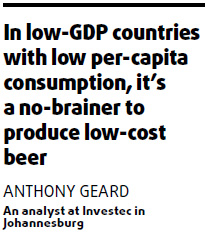

|
A handout photograph shows sorghum farming in Zambia. SABMiller Plc plans to grab some of sub-Saharan Africa's $3 billion home-brew market with cheaper beers made from domestic crops like sorghum and cassava, enlisting 55,000 local farmers to produce grains by 2012. Bloomberg News |
SABMiller Plc plans to grab some of sub-Saharan Africa's $3 billion home-brew market with cheaper beers made from domestic crops like sorghum and cassava, enlisting 55,000 local farmers to produce grains by 2012.
"Beer is a very small part of alcohol consumption in Africa," Mark Bowman, who heads the London-based company's African unit, said in an interview this week at his office in downtown Johannesburg. "That is our opportunity." Securing African ingredients could allow SAB to slash the price of a beer by 30 percent, he said.
SABMiller, founded in 1895 and formerly known as South African Breweries, makes beer in 15 other sub-Saharan countries. Bowman's $3 billion estimate for the region's home-brew market, excluding South Africa, is almost double the $1.6 billion that the area's consumers spend on industrially produced beer.
In much of sub-Saharan Africa, people make their own opaque, chunky brew from grains such as millet and sorghum, which is usually grown in dry areas and ground into meal. Low incomes limit local consumption to an average of six to nine liters per person in many nations, compared with 50 to 56 liters in South Africa, Bowman said.
SAB's Ugandan arm has made Eagle, a clear sorghum beer, since 2002. It's the company's best-seller in Uganda and has been introduced to four other African markets.
Consumers find clear beers "aspirational," and would drink more of them if they were cheaper, Bowman said. SABMiller breweries also make opaque beer, including the Chibuku brand.
"In low-GDP countries with low per-capita consumption, it's a no-brainer to produce low-cost beer," said Anthony Geard, an analyst at Investec in Johannesburg.
Community support

"It's eminently sensible to broaden the clear beer market to include more commercially available sorghum brands," Geard said. "It creates a new market, and gets the local government and community on side."
SABMiller moved its head office to London this decade and is now the world's second-largest brewer, having grown by acquisitions including US-based Miller Brewing Co.
Bowman said the brewer was partly spurred into action by surging commodity prices in recent years. Cereal prices jumped 43 percent in 2008, according to the United Nations Food and Agriculture Organization.
SAB's capital spending in sub-Saharan Africa will decline after the company completed some major investments, Bowman said.
Spending this fiscal year will reach about 75 percent of the $380 million to $400 million spent in the 12 months ended March 31, and be further reduced to less than $250 million annually within a few years, he said.
Lower taxes, cassava
SAB plans new breweries in southern Tanzania and northern Mozambique this year. The company has also proposed investing in state breweries in Ethiopia and may acquire more non-alcoholic businesses, such as bottled-water plants, he said.
A local supply chain has tax advantages, said Investec's Geard, as traditional brewing in the region relies heavily on imported barley and malt, both subject to customs duties. "If you can control the supply chain all the way from the fields, it makes the costs a lot more controllable," the analyst said.
Bowman said the brewer already buys crops from 15,000 farmers in the region.
A pilot project to grow cassava for brewing has begun in oil-rich Angola, where SABMiller this year opens a 2.5 million hectoliter plant in the capital, Luanda. That's SAB's biggest brewery in the region outside South Africa.
No major deals
Cassava will be used to add flavor rather than being the main ingredient, Bowman said. Trials of the crop are also taking place in Ghana, while barley trials are being conducted in Zambia and Mozambique. Like the potato, cassava is a tuber crop. Tapioca is a root starch derived from the vegetable.
SAB is unlikely to make major acquisitions in the region following this year's purchase of a stake in Nigeria's Pabod Breweries, Bowman said.
That "filled our only obvious gap", he said. Pabod has since reintroduced brands such as Grand Lager and Grand Malt and may bring more to the market.
Besides its 15 clear-beer plants and 10 sorghum breweries in the region, SAB has an interest in 19 other African nations through its venture with privately held Castel Group of France. SAB would like to boost its stake in that relationship, Bowman said, though there is "no prospect of that in the short term."
Elsewhere in Africa, SABMiller has also agreed to invest $12 million in Zimbabwe's Delta Corp, raising its stake by 2.5 percentage points to about 38 percent and finance a new production line. Bowman said that's the first investment in the company's brewing activities in a decade.
In southern Sudan, where SAB built the region's first brewery, the "White Bull" brand has been introduced. SAB is looking into growing crops domestically, and soft-drink production will start soon.
Bloomberg News
(China Daily 06/08/2009 page11)













